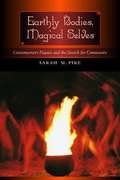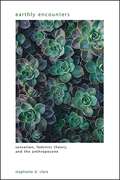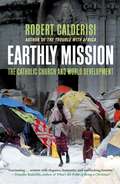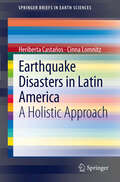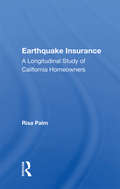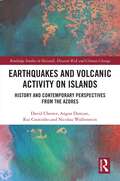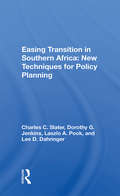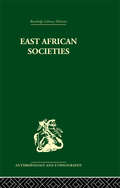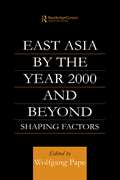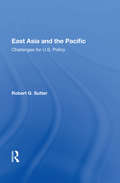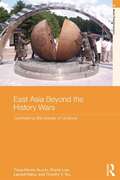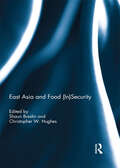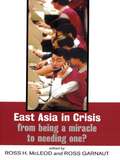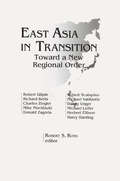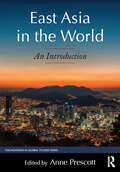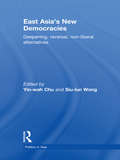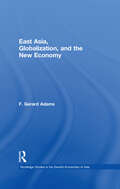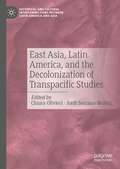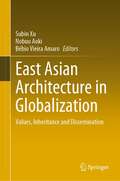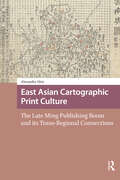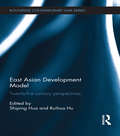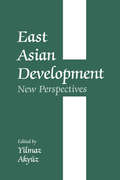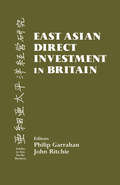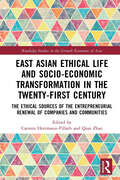- Table View
- List View
Earthly Bodies, Magical Selves: Contemporary Pagans and the Search for Community
by Sarah M. PikeThis book is the first ever comprehensive study of neo-pagans and modern day neo-pagan festivals. Neo-paganism is the latest of new religions to emerge on the scene, its popularity growing in both Europe and North America as followers attempt to wed environmental concerns with traditional spirituality.
Earthly Encounters: Sensation, Feminist Theory, and the Anthropocene (SUNY series in Gender Theory)
by Stephanie D. ClareEarthly Encounters develops a fuller account of the lived experience of racialized gender formation as it exists on this planet, earth. It analyzes sensations: the chill of winter, the warm embrace of the wind, the feeling of being immersed in water, and a stifling sense of containment. Through this analysis in settler colonial and colonial contexts, in twentieth-century North America and Africa, Stephanie D. Clare shows how sensation is unevenly distributed within social worlds and productive of racial, national, and gendered subjectivities. From revealing the relevance of phenomenology, especially in the writings of Maurice Merleau-Ponty and Frantz Fanon, to debates concerning new materialism and affect theory, Clare shows how the phenomenology of race and gender must consider both the production of the body-subject and the environment. She concludes by making a case for the continued significance of sensation in the context of the Anthropocene.
Earthly Mission
by Robert CalderisiWith 1. 2 billion members, the Catholic Church is the worlds largest organization and perhaps its most controversial. The Churchs obstinacy on matters like clerical celibacy, the role of women, birth control, and the child abuse scandal has alienated many Catholics, especially in the West. Yet in Africa, Asia, and Latin America, the Church is highly esteemed for its support of education, health, and social justice. In this deeply informed book, Robert Calderisi unravels the paradoxes of the Catholic Churchs role in the developing world over the past 60 years. Has the Catholic Church on balance been a force for good? Calderisi weighs the Churchs various missteps and poor decisions against its positive contributions, looking back as far as the Spanish Conquest in Latin America and the arrival of missionaries in Africa and Asia. He also looks forward, highlighting difficult issues that threaten to disrupt the Churchs future social role. The authors answer to the question he poses will fascinate Catholic and non-Catholic readers alike, providing a wealth of insights into international affairs, development economics, humanitarian concerns, history, and theology.
Earthquake Disasters in Latin America
by Cinna Lomnitz Heriberta CastañosThis book is an attempt to demonstrate the analytical power of the holistic approach for understanding disasters. Six major earthquakes in Latin America are used as an example: the general idea is to place disasters in a broad social and regional context. Understanding disasters is a way of understanding the social system. The idea is to show that every major disaster is unique and different. Statistical methods may be useful for purposes of risk estimation but modern disasters are "systemic" and complex. In the chapter on the 2010 Chile earthquake we discuss the tsunami and why the system of tsunami alert did not work. The introductory chapter contains some basics of seismology (plate tectonics) and earthquake engineering. The 1985 Mexico earthquake describes why geology is important. Why was Mexico City founded in a lake? Technology must be adapted to the environment, not "imported" from possibly more advanced but different societies. The 1970 Peru earthquake is an example of disaster in a unique environment. Caracas 1967 takes us on a survey of different engineering solutions. And the 1960 Chile earthquake leads us on a retrospective survey--what has changed in Chile between the two major Chile earthquakes? A discussion on Charles Darwin's observations of the 1835 Chile earthquake provides a fitting summary.
Earthquake Insurance: A Longitudinal Study Of California Homeowners
by Risa PalmThis book explores the nature of the earthquake hazard and the availability of insurance and reports on a longitudinal study of homeowners in four California counties to chart their growing concern with earthquakes.
Earthquakes and Volcanic Activity on Islands: History and Contemporary Perspectives from the Azores (Routledge Studies in Hazards, Disaster Risk and Climate Change)
by David K. Chester Angus Duncan Rui Coutinho Nicolau WallensteinThis volume examines the impact of and responses to historic earthquakes and volcanic eruption in the Azores. Study is placed in the contexts of: the history and geography of this fascinating archipelago; progress being made in predicting future events and policies of disaster risk reduction. This is the only volume to consider the earthquake and volcanic histories of the Azores across the whole archipelago and is based, not only on contemporary published research, but also on the detailed study of archival source materials. The authors seek to show how extreme environmental events, as expressed through eruptions, earthquakes and related processes operating in the past may be considered using both complementary scientific and social scientific perspectives in order to reveal the ways in which Azorean society has been shaped by both an isolated location in the middle of the Atlantic Ocean and the ever present threat of environmental uncertainty. Chapter 2, which analyses in depth the geology and tectonics of the islands is of more specialist interest, but technical terms are fully explained so as to widen the accessibility of this material. The audience for this volume includes all those who are interested in the geology, geography, history and hazard responses in the Azores. It is written, not just for the educated general reader, but for the specialist earth scientist and hazard researcher.
Earthworks Rising: Mound Building in Native Literature and Arts (Indigenous Americas)
by Chadwick AllenA necessary reexamination of Indigenous mounds, demonstrating their sustained vitality and vibrant futurity by centering Native voices Typically represented as unsolved mysteries or ruins of a tragic past, Indigenous mounds have long been marginalized and misunderstood. In Earthworks Rising, Chadwick Allen issues a compelling corrective, revealing a countertradition based in Indigenous worldviews. Alongside twentieth- and twenty-first-century Native writers, artists, and intellectuals, Allen rebuts colonial discourses and examines the multiple ways these remarkable structures continue to hold ancient knowledge and make new meaning—in the present and for the future.Earthworks Rising is organized to align with key functional categories for mounds (effigies, platforms, and burials) and with key concepts within mound-building cultures. From the Great Serpent Mound in Ohio to the mound metropolis Cahokia in Illinois to the generative Mother Mound in Mississippi, Allen takes readers deep into some of the most renowned earthworks. He draws on the insights of poets Allison Hedge Coke and Margaret Noodin, novelists LeAnne Howe and Phillip Carroll Morgan, and artists Monique Mojica and Alyssa Hinton, weaving in a personal history of earthwork encounters and productive conversation with fellow researchers.Spanning literature, art, performance, and built environments, Earthworks Rising engages Indigenous mounds as forms of &“land-writing&” and as conduits for connections across worlds and generations. Clear and compelling, it provokes greater understanding of the remarkable accomplishments of North America&’s diverse mound-building cultures over thousands of years and brings attention to new earthworks rising in the twenty-first century.
Easing Transition In Southern Africa: New Techniques For Policy Planning
by Charles C. SlaterIn response to the volatile political, social, and economic situation in Southern Africa, this book provides a new framework for the difficult task of policy planning in times of stress and radical transition. The authors report on two complementary research methodologies--channel mapping and simulation modeling--and their combination to form a pow
East African Societies (Library Of Man Ser.)
by Aylward ShorterFocussing on the mechanics of social change and the interaction between ethnic groups, cultures, structures and value systems the background questions of ecology, demography and history are also examined and the process of urbanization and rural revolution described. Trends in marriage and family life, education and religious ideas are also discussed and case studies from each country included. First published in 1974.
East Asia 2000 and Beyond: Shaping Factors/Shaping Actors (English-language Series Of The Institute Of Asian Affairs Ser. #Vol. 1)
by Wolfgang PapeThis wide ranging survey uses the latest methodological apparatus including sophisticated computer modelling techniques to identify the key political, social and economic trends which are likely to shape the East Asian region at the millennium and beyond.
East Asia And The Pacific: Challenges For U.s. Policy
by Robert G. SutterAs the cold war ends, the United States is being forced to reassess the dominant role it has played in East and Southeast Asia and the Pacific during the decades that followed World War II. Bringing readers up to date on policy trends in the area, the author provides a general overview as well as detailed analyses of key issues in individual nations and regions. The author concludes by placing these regional developments in the context of the ongoing debate in the United States over an appropriate foreign policy in the post-cold war world.
East Asia Beyond the History Wars: Confronting the Ghosts of Violence (Asia's Transformations)
by Tessa Morris-Suzuki Timothy Y. Tsu Morris Low Leonid PetrovEast Asia is now the world’s economic powerhouse, but ghosts of history continue to trouble relations between the key countries of the region, particularly between Japan, China and the two Koreas. Unhappy legacies of Japan’s military expansion in pre-war Asia prompt on-going calls for apologies, while conflicts over ownership of cultural heritage cause friction between China and Korea, and no peace treaty has ever been signed to conclude the Korean War. For over a decade, the region’s governments and non-government groups have sought to confront the ghosts of the past by developing paths to reconciliation. Focusing particularly on popular culture and grassroots action, East Asia beyond the History Wars explores these East Asian approaches to historical reconciliation. This book examines how Korean historians from North and South exchange ideas about national history, how Chinese film-makers reframe their views of the war with Japan, and how Japanese social activists develop grassroots reconciliation projects with counterparts from Korea and elsewhere. As the volume’s studies of museums, monuments and memorials show, East Asian public images of modern history are changing, but change is fragile and uncertain. This unfinished story of East Asia’s search for historical reconciliation has important implications for the study of popular memory worldwide. Presenting a fresh perspective on reconciliation which draws on both history and cultural studies, this book will be welcomed by students and scholars working in the fields of Asian history, Asian culture and society as well as those interested in war and memory studies more generally.
East Asia and Food (In)Security
by Shaun Breslin and Christopher W. HughesThis book presents a study of perceptions of food insecurity in East Asia, and explores how individual countries are developing strategies to deal with the situation. It also looks at how the perception of food insecurity has increasingly influenced the nature of international interactions, not just within East Asia, but also in the region’s relations with major external actors. Many of the challenges facing East Asia are generic food security issues that face people and governments across the world – for example, the implications of climate change and demographic changes on food supplies. This book places the East Asian context in the wider discussion of food (in)security in global politics. However, it also identifies potential regional ‘differences’ – for example, the significance of rice for the region, and the unavoidable impact of China as a major regional player. What the Chinese state, and Chinese companies, decide to do in response to concerns about food insecurity have an impact not just on the rest of the region, but on the rest of the world. Taking too much of a Sinocentric focus, however, ignores other actors in East Asia, or merely relegates discussion to how they respond to Chinese policies or external strategies. This book considers the region as a whole, both when it comes to thinking about food security challenges and responses within the region itself, and also in the outward projection of regional food insecurity on the rest of the world.This book was published as a special issue of The Pacific Review.
East Asia in Crisis: From Being a Miracle to Needing One?
by Ross Garnaut Ross H. McLeodThe current economic crisis in East Asia is unprecedented in world economic history. It seemed the economic strength of the region, until very recently, would just keep growing. Now, the macroeconomic achievements of Asia are under threat and the economies of North America and Europe are feeling the results. This book brings together the thoughts of leading experts on the Asian economy and provides a broad and thorough analysis of the situation. It provides case studies from fourteen countries in the region, how the crisis developed and affected them, and the response from governments. There are other non-country specific chapters with a strong theoretical content which address issues such as causation, how such a crisis should be handled, how it might be avoided in the future, and the likely implications for on-going deregulatory and other economic reforms. This is an important authoritative account of one of the most extraordinary economic events and provides a broad synthesis of case studies and theoretical approaches from a variety of researchers with an intimate knowledge of the region.
East Asia in Transition: Toward a New Regional Order
by Robert S. Ross"Has uniformly good essays on economic and political change, the policies of the great and local powers, and the prospects for building a new regional order". -- Foreign Affairs
East Asia in the World: An Introduction (Foundations In Global Studies)
by Anne PrescottFrom the Foundations in Global Studies series, this text offers students a fresh, comprehensive, multidisciplinary entry point to East Asia. After a brief introduction to the study of East Asia, the early chapters of the book survey the essentials of East Asian history; important historical narratives; and the region's languages, religions, and global connections. Students are guided through the material with relevant maps, resource boxes, and text boxes that support and guide further independent exploration of the topics at hand. The second half of the book features interdisciplinary case studies, each of which focuses on a specific country or region and a particular issue. Each chapter gives a flavor for the cultural distinctiveness of the particular country yet also draws attention to global linkages. Readers will come away from this book with an understanding of the larger historical, political, and cultural frameworks that shaped East Asia as we know it today, and of current issues that have relevance in Asia and beyond.
East Asia's New Democracies: Deepening, Reversal, Non-liberal Alternatives (Politics in Asia)
by Yin-Wah ChuThis collection brings us up-to-date on the contemporary situations in the new democracies of East Asia, and debates on the prospect of introducing liberal democracy to this part of the world. The chapters cover a wide range of cases, including in-depth examination of China, Korea, Taiwan, the Philippines, Thailand, and broad comparisons of Malaysia, Singapore, Indonesia, Vietnam, and other countries. The contributors, who are foremost experts in their fields, examine the roles performed by civil society, social classes, and strategic groups, as well as the intertwining of values and interests in the transition to, consolidation of, and reversal from democracy. They also evaluate the extent to which these new democracies have facilitated regional peace, helped extend social welfare benefits, bolstered poverty alleviation, and upheld the rule of law and human rights. Grounding their analyses in the historical development of these societies, and/or examining them through the comparative strategy they also explore the desirability of liberal democracy, whether in the subjective assessment of the Asian people or in relation to the social-political challenges faced by these Asian countries. East Asia’s New Democracies will be of interest to students and scholars of comparative politics, political science, political sociology, East and Southeast Asian studies.
East Asia, Globalization and the New Economy (Routledge Studies in the Growth Economies of Asia)
by F. Gerard AdamsWe are witnessing a transformation in the world economy as a result of the IT/e-business revolution. Modern logistics based on cheap communication and transportation are shifting the locus of production and the international division of labour between the West and the lower wage countries of East Asia and similar changes are occurring within East Asia itself. Looming over the entire picture is the colossus that is China and this transformation is making East Asia the manufacturing centre of the world economy. Written by a recognized expert in the area of business economics, this book analyzes these developments and evaluates their future impact on the development of East Asia and its role in the world economy. The book examines the effect of the IT revolution, globalization and the 'new economy' on the development of East Asia. The first book-length treatment of IT/e-business in the region, it questions whether the e-business revolution will renew and sustain the rapid economic development of East Asia.
East Asia, Latin America, and the Decolonization of Transpacific Studies (Historical and Cultural Interconnections between Latin America and Asia)
by Chiara Olivieri Jordi Serrano-MuñozIn this collective work, researchers from different disciplines reflect upon the challenges and opportunities of decolonizing transpacific studies through the lens of a few paradigmatic case-studies that deal with connections between East Asia and Latin America. The present book offers a productive problematization of the idea of the transpacific as a concept and a space that is not restricted to a single definition. We defend that the transpacific can instead promote an understanding of agents and experiences that share many common traits that have been generally overlooked by a hegemonic interpretation of knowledge and the relationship between regions.By fostering an environment that not only accepts a plurality of views but that actively looks to accommodate analogous, tangential, and even contradicting approaches to the study of our ideas, we seek a double objective. First, we hope to highlight precisely the richness within the idea of the transpacific, avoiding sticking to any particular conception to it while at the same time acknowledging and owning each of our points of enunciation. Our second objective is part of a constant struggle in the quest towards social and epistemic justice. By adopting this stance of plurality, we can fight against structures of knowledge production and reproduction that willingly or unintentionally instill specific interpretations in ways that inculcate exclusivity.The goal of this book is opening up and expanding the debate regarding transpacific connections, examining the limits and promises of including these experiences within the conceptual paradigm of the Global South, and showcasing different ways of approaching decolonial research to the study of the relationship between East Asia and Latin America.
East Asian Architecture in Globalization: Values, Inheritance and Dissemination
by Subin Xu Nobuo Aoki Bébio Vieira AmaroThis book collects a selected list of peer-reviewed papers presented at EAAC 2017, International Conference on East Asian Architectural Culture, the leading conference on architectural history and built heritage conservation in the East Asia region. While centered around the core issue of globalization and its complex effects on East Asian architectural cultures, the selected papers were arranged into four major sub-topics: Historical & Theoretical Research; Conservation Methodology & Technology; Adaptive Reuse; and Community Design. All together, this collection showcases the most recent disciplinary developments in East Asian countries, as well as the main concerns and prospects of leading practitioners. The wide range of contributions and perspectives included here in English language for a global audience should be of considerable appeal to all scholars and professionals in the fields of architectural and urban design, history of the built environment, and heritage conservation policies and methods.
East Asian Cartographic Print Culture: The Late Ming Publishing Boom and its Trans-Regional Connections (Global Chinese Histories, 250-1650)
by Alexander AkinAlexander Akin examines how the expansion of publishing in the late Ming dynasty prompted changes in the nature and circulation of cartographic materials in East Asia. Focusing on mass-produced printed maps, East Asian Cartographic Print Culture: The Late Ming Publishing Boom and its Trans-Regional Connections investigates a series of pathbreaking late sixteenth- and early seventeenth-century works in genres including geographical education, military affairs, and history, analysing how maps achieved unprecedented penetration among published materials, even in the absence of major theoretical or technological changes like those that transformed contemporary European cartography. By examining contemporaneous developments in neighboring Choson Korea and Japan, this book demonstrates the crucial importance of considering the East Asian sphere in this period as a network of communication and publication, rather than as discrete national units with separate cartographic histories. It also reexamines the Jesuit printing of maps on Ming soil within the broader context of the local cartographic publishing boom and its trans-regional repercussions.
East Asian Development Model: Twenty-first century perspectives (Routledge Contemporary Asia Series)
by Shiping Hua Ruihua HuGiven the impressive growth in East Asia after World War II, initially led by Japan, the region's development models have been scrutinized since the 1980s. The shared Confucian cultural heritage, strong government guidance, and export led economies were often cited as contributors to the impressive growth. However, major changes have taken place in Asia on and around the turn of the century: Japan experienced two decades of economic slow-down, while World Bank figures reveal that China is poised to become the largest economy in the world in 2014, overtaking the United States. Bearing this in mind, is it even possible to formulate an East Asian development model in the context of a shifting twenty-first century? And if so, what is it? This book addresses this issue by looking at the economic, political and cultural perspectives of China, Japan and South Korea, focusing on dynamism and potential consensus regarding an East Asian development model. The chapters offer a historical background to the East Asian development model, as well as in-depth case studies of each of the countries concerned to show that whilst the East Asian development model does have distinct characteristics as compared with other areas, and other countries may draw some insights from the East Asian experience, it is not a panacea that fits all circumstances and fits all times. This book will be welcomed by students and scholars of Asian economics, Asian politics, international political economy and development studies.
East Asian Development: New Perspectives
by Yilmaz AkyüzThis collection of papers challenges the conventional view of East Asian development driven by open and efficient markets and suggests that considerable diversity both at the institutional level and in policy approaches lies behind the region's rapid economic growth.
East Asian Direct Investment in Britain (Studies In Asia Pacific Business)
by John Ritchie Philip GarrahanThe contributions investigate indicators of change and the interaction with FDI from East Asia against the background of changes in the regional economy since the mid 1980s. They discuss in particular how the North tackled long-term decline and the long-term implications for the region.
East Asian Ethical Life and Socio-Economic Transformation in the Twenty-First Century: The Ethical Sources of the Entrepreneurial Renewal of Companies and Communities (Routledge Studies in the Growth Economies of Asia)
by Carsten Herrmann-Pillath Qian ZhaoThis book considers ethical culture in East Asia, examines the impact it has had on economic and social transformation, and explores what effect it might have on solving current problems. It views the ethical culture of East Asia, that is, the beliefs, values, and practices that define East Asian societies’ conceptions of ethics in everyday life, as different from what pertains in the West, with more emphasis in East Asia on respect for ancestors, concern about propriety of behaviour, and notions of community. The book discusses how these particular East Asian values are being applied, for example, in family businesses, and how they might further be applied to solve current crucial challenges for humanity, such as climate change, ageing, and persistent inequality, challenges that are not being solved by an exclusive focus on economic growth alone. The book includes a consideration of ethical innovation, for example, distinct forms of ecological ethics enshrined in newly emerging economic organizations, such as social entrepreneurship.
